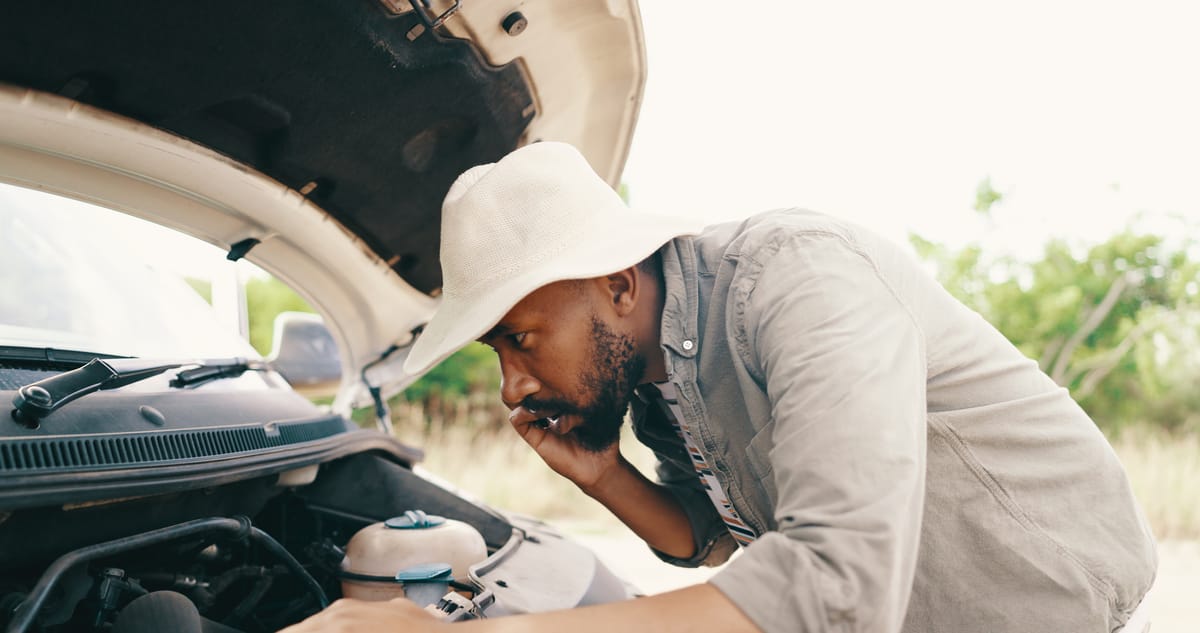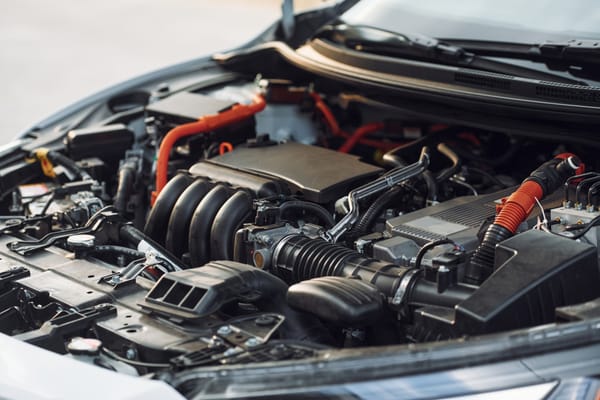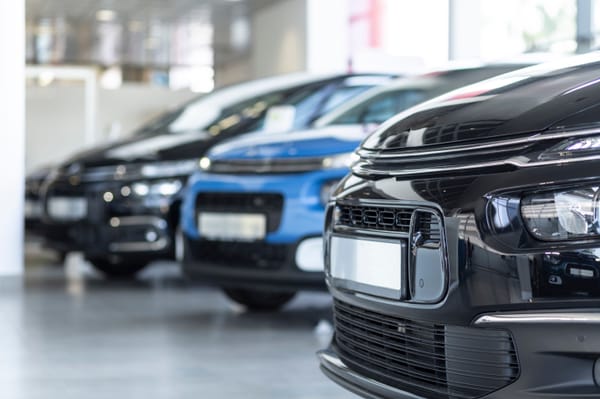Buyer’s Remorse: How Juma’s Dream of a BMW Turned into a Money Pit

Buying a car for the first time is a big deal for everyone. There's the excitement, the rush of emotions, the feeling that now, now umemake it is real! It’s a symbol of freedom, a step up in life.
And when you start with a BMW, there's something undeniably appealing. The brand carries a certain prestige, a promise of a great driving experience and envy on the road.
Juma Fredrick knows this feeling only too well. We’d talked about buying cars for a respectable number of years. But between hustling and raising a family, the endeavour wasn’t as easy as we thought. But in 2023, Juma decided he was getting himself a car, whatever the cost. And a car he got, a 2008 BMW 320i.
But his excitement didn’t last long.
The Nissan Note Saga
Before Juma ended up with the BMW, he’d first gotten a pretty decent Nissan Note, which was well-maintained, and frankly, looked new. The only problem was that he didn’t have enough cash. Therefore, he borrowed Ksh200,000 from a friend. He added what he had, bringing the total to Ksh530,000. However, the seller, for whatever reason, wanted Ksh620,000.
Since Juma couldn’t meet the price, he asked the seller, who was accompanied by three friends, if they could complete the transaction and sign an agreement regarding how he would pay the remaining balance.
The seller agreed, but then said they would go with the money, the car, and the logbook and once he was ready, he’d be handed everything. Red flag. He said no and walked away.
“I knew I was getting scammed, and if it weren’t for Noah (his friend who owns a garage), I would’ve agreed,” Juma said during a phone call interview with Peach Cars.
How He Ended Up with the BMW
Lucky for him, the mechanic friend reached out to him a few days later and asked him if he’d be interested in a BMW. Like any other car enthusiast, he was immediately drawn to the brand. The asking price? It was cheaper than the Nissan Note, which means he could afford it!
The 2008 BMW 3 Series (320i) felt like the perfect opportunity to accomplish his car ownership dream. The seller was moving, which added a bit of urgency to the deal.
Again, in the company of the mechanic, Juma visited the seller’s home in Uthiru to check the car. During the inspection, the seller mentioned a few ‘minor’ issues like some of the lights not working, a faulty radio, and an issue with the driver's side window not opening. That seemed like a small thing, and he used it as an opportunity to bargain for a lower price.
He closed the deal. The seller did the vehicle transfer of ownership online and even went a step further to negotiate with his insurance agent to give Juma a favourable third-party insurance. Juma thought he'd found a bargain, a quick route to owning the car he wanted.
What is it they say again? Jump out of the frying pan into the fire. Yes, Juma did exactly that.
The Reality Check
A few days after closing the deal, problems started showing up. That window problem? It wasn't just a simple fix. The entire door stopped working and he had to enter the vehicle through the passenger side so he could drive. This meant a more complex repair to the door locking mechanism.
Electrical issues are apparently quite common in the BMW 3 Series. Repairing door locking mechanisms can involve replacing the actuator, the latch, or a relay, with costs varying significantly. In Juma’s case, he replaced the actuator and the latch. Although not a significant amount, this expense was unexpected.
“I took the seller for his word, on gentlemen's agreement like Gachagua and Ruto. How was I to know the door would stop working altogether?” he said.
Well, the fact that the seller downplayed the initial window issue should’ve raised questions about whether they were being dishonest or simply didn't know the car's real condition.
Juma ended up replacing lights and gradually servicing the car, dealing with one problem at a time.
The tyres were in bad shape. And when it comes to cars, this isn’t just a cosmetic issue; it is a safety hazard. He realised this after driving in the rain. The tyres didn’t have a firm grip on wet ground, especially when he braked.
New tyres in Kenya can cost anywhere from Ksh 8,000 to Ksh 20,000 each. Three months later, he spent Ksh 62,000 for the four tyres. Wheel alignment added another Ksh 4,000 to the bill.
Juma, thinking he was done with repairs, tried to make the car look better by buffing out scratches and dents. While that improved the appearance, it didn’t address the mechanical problems that were yet to surface.
“As a first-time car owner, it's easy to get caught up in how a car looks, but it's what's underneath that really counts. I’ve come to painfully learn this fact,” he said.
One weekend in June 2024, during a trip to his home village, Bungoma, Juma’s beloved BMW broke down in the middle of nowhere, along the Nakuru-Eldoret highway. The first mechanic he got after a few calls couldn’t determine the issue. So, he had the vehicle towed to the nearest garage – another cost.
“At the garage, while I was narrating my ordeal, the mechanic laughed and said, ‘bro, hii gari haina mafuta’ (you ran out of fuel),” Juma remembers.
“No. The fuel gauge says I still have fuel.” He insisted.
He asked the mechanic to check the vehicle for him, and yes, the fuel had run out. There was another problem, the fuel sending unit wasn’t working. It needed a replacement. This cost him Ksh 20,600 including labour. This was another revelation to Juma, that even small electrical problems can cause major headaches.
Over time, he did more repairs and upgrades. Although the car started looking better, the ongoing repairs were costing a lot more than he'd anticipated.
When Juma finally added up all the repair bills, he was shocked. The money he’d spent on fixing the BMW was just a few thousand shy of the price he bought it at. Summed up, the money, he realized, could have bought him a much better-maintained BMW 3 Series.
It’s a classic case of a false economy: a cheap initial price masking a lot of expensive problems. The purchase price is just the beginning; maintenance and repairs can really inflate the overall cost of owning a used car.
Buyer's Remorse is a Common Feeling
Juma's situation is a good example of buyer's remorse. He was initially excited, but that quickly turned into disappointment and frustration as he faced a constant stream of repairs and growing expenses.
Buyer's remorse is a common feeling when a big purchase doesn't live up to your expectations or leads to unexpected financial strain. The best way to avoid this when buying a used car is to take your time and do your due diligence.
While tough, this provides some valuable lessons for anyone thinking about buying a used car.
- Get a Pre-Purchase Inspection: This is crucial. Have a trusted mechanic thoroughly check the car before you buy it, especially if you're buying from a private seller. A pre-purchase inspection (PPI) can uncover existing problems and potential future issues, giving you an unbiased view of the car's condition. You can use this information to negotiate a better price or, if necessary, walk away from a bad deal. Services like the 288-point inspection by Peach Cars can be immensely helpful in this process.
- Check the Service History: Always ask to see the car's service history. A well-documented service history shows that the car has been regularly maintained, which makes major hidden problems less likely. If possible, verify the service records with dealerships or independent garages.
- Be Wary of "Too Good to Be True" Deals: Exceptionally low prices are often a warning sign. They can indicate that the seller is hiding something.
- Take a Comprehensive Test Drive: Don't just drive around the block. Test the car under different conditions and pay attention to any unusual noises, vibrations, or handling issues.
- Don't Ignore Warning Lights: Dashboard warning lights, even if they come and go, should always be taken seriously. They usually point to underlying mechanical or electrical problems.
- Verify Legal Documentation: Before you pay, double-check all the legal documents, including the car's logbook, to confirm ownership and make sure there are no outstanding liens or legal problems. In Kenya, you can do an NTSA search to get information about the car's history.
- Consider Buying from Reputable Dealers: For more security, think about buying from reputable used car dealers. They often do their own inspections and may offer warranties.
- Seek Expert Advice: If you're not a car expert, get advice from a trusted mechanic or a knowledgeable friend (Noah failed Juma terribly – story for another day).
- Be Patient: Buying a car is exciting, but don't rush into it. Doing thorough checks can save you from costly regrets later. Sometimes, the desire for a specific brand or model can cloud your judgment, which might have happened to Juma with his BMW.
While it's great to dream about owning a specific car, skipping essential checks can turn that dream into a financial nightmare. Always be careful. This will lower your risk and hopefully help you drive away with a used car you'll enjoy, not regret.
If you lack experience in assessing used cars, you could buy an already inspected, well-maintained used car or reach out to us at Peach Cars for expert advice. We’ll be glad to help!
Sources:Cost of tyre replacement: automotivedoctor.co.ke, accessed on March 19, 2025, https://automotivedoctor.co.ke/the-cost-of-car-ownership-in-kenya-what-you-need-to-know/#:~:text=Replacing%20tires%20and%20ensuring%20proper,wear%20and%20improving%20fuel%20efficiency.




